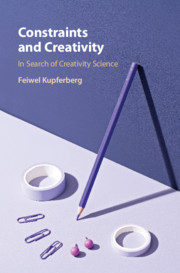Book contents
- Constraints and Creativity
- Constraints and Creativity
- Copyright page
- Contents
- Prolegomenon
- Preface
- Introduction
- Part I In Search of Creativity Science
- Part II Elaborating the Theoretical Model
- Part III Conclusions: First Principles of Creativity Science
- Chapter 7 Concepts and Knowledge Object
- Chapter 8 Data, Methods and Constraints
- References
- Index
Chapter 7 - Concepts and Knowledge Object
from Part III - Conclusions: First Principles of Creativity Science
Published online by Cambridge University Press: 09 July 2021
- Constraints and Creativity
- Constraints and Creativity
- Copyright page
- Contents
- Prolegomenon
- Preface
- Introduction
- Part I In Search of Creativity Science
- Part II Elaborating the Theoretical Model
- Part III Conclusions: First Principles of Creativity Science
- Chapter 7 Concepts and Knowledge Object
- Chapter 8 Data, Methods and Constraints
- References
- Index
Summary
What is the knowledge object of creativity science and how can this knowledge object and methods to study it best be conceptualized? Concepts are crucial for scientific forms of creativity, but concepts cannot be taken for granted. This is the approach of the professional teacher confronting novices. In real life, core concepts are discovered by overcoming a number of constraints. But scientists are not the only ones doing creative work. This is the reason why the concept creativity regime is crucial for creativity science. But all creativity regimes (patterns of creativity) are ultimately modeled upon nature as prototype (n-creativity) but in different ways (problem situations/types of constraints). Clarifying the nature of these constraints helps us overcome the nature-culture divide, clarify core concepts such as knowledge constraints, physical constraints, intra- and inter species co-evolution, critique the current state of the art and identify unsolved problems for future research.
Keywords
Information
- Type
- Chapter
- Information
- Constraints and CreativityIn Search of Creativity Science, pp. 253 - 287Publisher: Cambridge University PressPrint publication year: 2021
